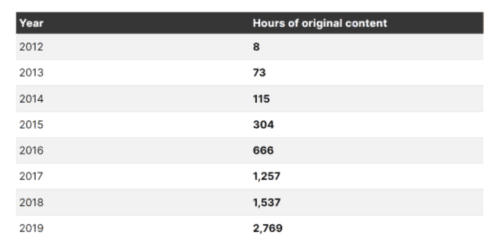A recent study by Allied Market Research says that the OTT global market size, valued at $121.61 billion dollars in 2019 is projected to reach $1,039.03 billion dollars by 2027. Part of that stems from the forced lockdowns by global governments which have inadvertently given the video streaming industry enormous gains in terms of subscription numbers. India, which is the fastest growing OTT market in the world, has had a whopping 60% growth in video on-demand subscriptions since 2018. This paradigm shift of content consumption towards OTT services has certainly given way to more revenue-generating opportunities for streaming service providers but it comes with a grand condition. One of them is the scalability of content.
Hang San-Yuk, Chairman of the Korean Communications Commissions called on local providers to work together to counter the expanding content influence of western streaming providers. South Korean broadcasters and mobile carriers have also released their own SVODs, scaling their content with exclusive local offerings. This has been possible because streaming providers are no longer dependent on a physical distribution strategy like television or cinema and are adopting a purely wireless system (Source). These are factors that not only drive a better business outcome for video streaming platforms but they also present the audience with better content viewing options. It therefore goes to say that for an OTT to have a successful run in such an ever-competitive marketplace, it has to be toe-to-toe in performance & delivery and whose content needs are on par with the rise in user subscriptions.
The ever-expanding OTT landscape has offered massive content scaling opportunities as on-demand video viewing rises. This is especially the case among viewers in the age group of 16 to 30 years. Millennials are seeking content that is bold, fast-paced and high in production value (Source). This has prompted content publishing houses to take action on the changing digital behaviours of their viewers. Where they once focused solely on making videos for social media, content creators are now diversifying their strategies and developing their own video streaming app. Scaling up content from social media to an OTT is certainly a resource intensive task but it is an investment that will go a long way in amassing a wider audience demographic. Undertaking this kind of a new approach to OTT content is a challenging task in itself. But Enveu’s expertise in OTT content services is going to make it a whole lot easier for you.
Netflix, which started out as a DVD rental service in the early 2000s has grown into not just another OTT streaming platform but a major entertainment industry leader today. One of the most substantial leaps that Netflix made in its growth was to move away from licensing other studios’ content and produce its own. This strategy of funding and producing their own catalogue of content would give them the rights to it in perpetuity.
Source
Soon, Netflix began producing local-language content to break into new territories, and then, bring the same local flavour to an international audience. It focused on developing stories that transcended cultural and stereotypical boundaries by making the content resonate with audiences worldwide for a universal appeal.
In essence, scaling up is essential to any business and brand. Whether you are the CEO or CTO of a publishing house, head of content marketing, or a solo entrepreneur, the bottom line is that content, which is the end-product the consumer sees in an OTT service, requires innovative scaling to reach more people.
Need expert guidance in strategizing your OTT development goals? Contact Enveu today!
Rahul Tripathi - Marketing Manager, Enveu
Rahul Tripathi is an experienced Brand and Marketing Strategist driven by ROI’s. As a Marketing Manager, he looks after the company's marketing efforts and helps the company to drive bucket loads of awareness and sales that generate revenues.

